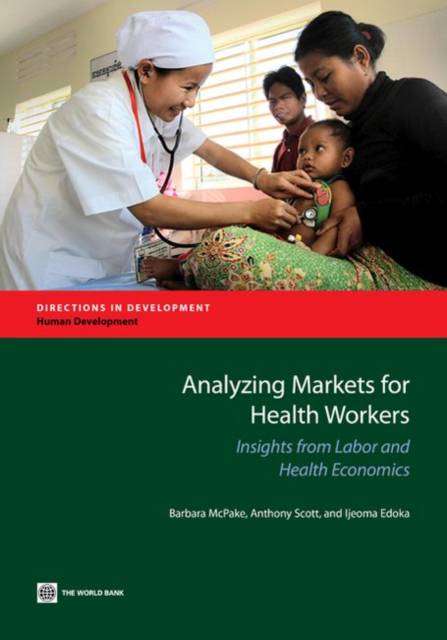
- Retrait gratuit dans votre magasin Club
- 7.000.000 titres dans notre catalogue
- Payer en toute sécurité
- Toujours un magasin près de chez vous
- Retrait gratuit dans votre magasin Club
- 7.000.0000 titres dans notre catalogue
- Payer en toute sécurité
- Toujours un magasin près de chez vous
Analyzing Markets for Health Workers
Insights from Labor and Health Economics
Barbara McPake, Anthony Scott, Ijeoma Edoka
50,95 €
+ 101 points
Description
"This publication is part of the Bank's multiyear program to enhance its knowledge of HRH policies. The program's ultimate objective is to strengthen knowledge and capacity to collect evidence, analyze, and evaluate the effectiveness of HRH interventions in the context of a country's health system strengthening strategy. It specifically addresses the theoretical and empirical evidence on health labor markets in low- and middle-income countries. Health labor market analysis has much to contribute to resolving globally widespread HRH problems, and their continuing neglect provides some explanation for their persistence. Policy makers in countries promulgating or refining strategies for achieving universal health coverage will find it important to understand how key elements in their health labor market are likely to interact and how these interactions could help-or hinder-progress toward universal health coverage. These interactions are complex and multidimensional, and this publication highlights some areas where forces in the health labor market matter most. The purpose of this publication is to provide an overview of the key issues when attempting to apply economics to the analysis of health workers' labor markets. Though much has been written and planned about health human resources, a major weakness with most of this analysis is that it does not use an economic perspective. The use of an explicit economic framework applied by trained economists moves the focus away from simplistic but costly policy responses such as training more doctors and nurses, toward understanding more carefully the role of incentives, productivity, and the distribution of health workers. The health workforce is but one part of the health system and a focus of analysis on only the health workforce is insufficient to be able to determine the optimal number of health workers. Market forces cannot be relied upon to solve health worker shortages or mal-distribution, due to well recognized market failures in health care. This also has implications for how labor economics and labor market analysis can be applied and used successfully in the health care sector."
Spécifications
Parties prenantes
- Auteur(s) :
- Editeur:
Contenu
- Nombre de pages :
- 96
- Langue:
- Anglais
- Collection :
Caractéristiques
- EAN:
- 9781464802249
- Date de parution :
- 01-06-14
- Format:
- Livre broché
- Format numérique:
- Trade paperback (VS)
- Dimensions :
- 178 mm x 254 mm
- Poids :
- 185 g

Les avis
Nous publions uniquement les avis qui respectent les conditions requises. Consultez nos conditions pour les avis.






